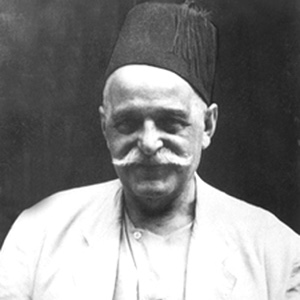
George Ivanovich Gurdjieff (1866 – 1949) was a mystic, philosopher, spiritual teacher, and composer. He was born in Alexandrapol (now Gyumri), Armenia, then part of the Russian Empire in the Transcaucasus, and spent his childhood in Kars. In early adulthood, Gurdjieff’s curiosity led him to travel to Central Asia, Egypt, Iran, India, Tibet and Rome before returning to Russia. In 1922 he established his Institute for the Harmonious Development of Man at the Chateau du Prieure at Fontainebleau, just outside Paris. Many of the methods and practices which became central to the work of Gurdjieff’s pupils were developed during this time. He introduced to the West a unique esoteric teaching of self-transformation that has been called “The Fourth Way.” Gurdjieff’s trilogy of books, titled All and Everything, contains the volumes Beelzebub’s Tales to His Grandson, Meetings with Remarkable Men, and Life Is Real Only Then, When “I Am”.

Quotes by G. I. Gurdjieff…
Everything that reaches us in the course of the day, and in the course of our whole life, is relative to us.
Here there are neither Russians nor English, Jews nor Christians, but only those who pursue one aim: to be able to be.
Remember yourself.
Our thinking machine possesses the capacity to be convinced of anything you like, provided it is repeatedly and persistently influenced in the required direction. A thing that may appear absurd to start with will in the end become rationalized, provided it is repeated sufficiently often and with sufficient conviction.
It is not so easy, merely to wish and you cross. For this it is indispensable, with a constantly active consciousness. First of all with extremely great intensity to obtain the intentional crystallization in oneself of the data for engendering in one’s common presence an unquenchable impulse of desire for such a crossing, and then will follow a long inner struggle, requiring great tension of all the inner forces.
Such is the nature of man, that for your first gift, he prostrates himself; for your second, kisses your hand; for the third, fawns; for the fourth, just nods his head once; for the fifth, becomes too familiar; for the sixth, insults you; and for the seventh, sues you because he was not given enough.
God is good, and He wishes a fulfillment for beings in the universe that they also may enjoy bliss and become sons — that they may enter into the psychology of the Being who created the World.
If there are phenomena, the reality of which we cannot deny but which cannot be fitted into our accepted conceptual framework, then something is wrong with that framework and we must look for another.
To know means to know all. Not to know all means not to know. In order to know all, it is only necessary to know a little. But in order to know this little, it is first necessary to know pretty much.
The Fourth Striving: From the beginning of one’s existence, to pay as quickly as possible for one’s arising and individuality, in order afterward to be free to lighten as much as possible the sorrow of our Common Father.
